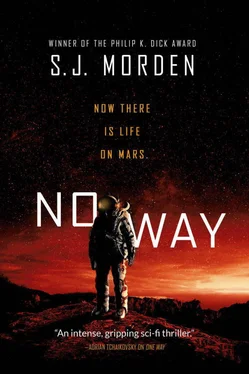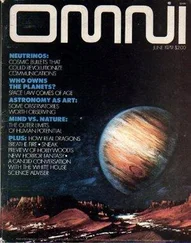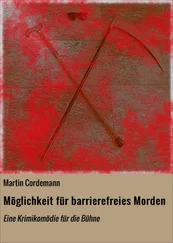“Yeah, and Wong’s a pizdobol, ” he said. His finger drifted from the cut-off switch and dragged through the air, pulling a window open to display all his current transactions. “Give me the order number.”
“Fine,” sighed the courier woman. He could hear traffic noise over her headset, and the sound of clattering plates in the background. He would never have described Wong’s as a café, and resolved to tell him later. They’d both laugh. She read off a number, and it matched one of his purchases. It was here at last.
“I’ll be with you in five,” he said, and cut off her protests about another job to go to with a slap of the red switch.
He peeled off the gloves. He pulled on yesterday’s clothes and scraped his fingers through his hair, scratching his scalp vigorously. He stepped into his boots and grabbed his own battered courier bag.
Urban camouflage. Just another immigrant, not worth shaking down. He pushed his glasses back up his nose and palmed the door open. When it closed behind him, it locked repeatedly, automatically.
The corridor echoed with noise, with voices, music, footsteps. Above all, the soft moan of poverty. People were everywhere, their shoulders against his, their feet under his, their faces—wet-mouthed, hollow-eyed, filthy skinned—close to his.
The floor, the walls, the ceiling were made from bare sheet metal that boomed. Doors punctured the way to the stairs, which had been dropped into deliberately-left voids and welded into place. There was a lift, which sometimes even worked, but he wasn’t stupid. The stairs were safer because he was fitter than the addicts who’d try to roll him.
Fitness was relative, of course, but it was enough.
He clanked his way down to the ground floor, five stories away, ten landings, squeezing past the stair dwellers and avoiding spatters of noxious waste. At no point did he look up in case he caught someone’s eye.
It wasn’t safe, calling a post-Armageddon container home, but neither was living in a smart, surveillance-rich neighborhood with no visible means of support—something that was going to attract police attention, which wasn’t what he wanted at all. As it stood, he was just another immigrant with a clean record renting an identikit two-by-four domik module in the middle of Clapham Common. He’d never given anyone an excuse to notice him, had no intention of ever doing so.
Street level. Cracked pavements dark with drying rain, humidity high, the heat already uncomfortable. An endless stream of traffic that ran like a ribbon throughout the city, always moving with a stop-start, never seeming to arrive. There was elbow-room here, and he could stride out to the pedestrian crossing. The lights changed as he approached, and the cars parted as if for Moses. The crowd of bowed-head, hunch-shouldered people shuffled drably across the tarmac to the other side and, in the middle, a shock of white-blond hair.
Wong’s was on the corner. Wong himself was kicking some plastic furniture out onto the pavement to add an air of unwarranted sophistication to his shop. The windows were streaming condensation inside, and stale, steamy air blew out the door.
“Hey, Petrovitch. She your girlfriend? You keep her waiting like that, she leave you.”
“She’s a courier, you perdoon stary . Where is she?”
Wong looked at the opaque glass front, and pointed through it. “There,” the shopkeeper said, “right there. Eyes of love never blind.”
“I’ll have a coffee, thanks.” Petrovitch pushed a chair out of his path.
“I should charge you double. You use my shop as office!”
Petrovitch put his hands on Wong’s shoulders and leaned down. “If I didn’t come here, your life would be less interesting. And you wouldn’t want that.”
Wong wagged his finger but stood aside, and Petrovitch went in.
The woman was easy to spot. Woman: girl almost, all adolescent gawkiness and nerves, playing with her ponytail, twisting and untwisting it in red spirals around her index finger.
She saw him moving toward her, and stopped fiddling, sat up, tried to look professional. All she managed was younger.
“Petrovitch?”
“Yeah,” he said, dropping into the seat opposite her. “Do you have ID?”
“Do you?”
They opened their bags simultaneously. She brought out a thumb scanner, he produced a cash card. They went through the ritual of confirming their identities, checking the price of the item, debiting the money from the card. Then she laid a padded package on the table, and waited for the security tag to unlock.
Somewhere during this, a cup of coffee appeared at Petrovitch’s side. He took a sharp, scalding sip.
“So what is it?” the courier asked, nodding at the package.
“It’s kind of your job to deliver it, my job to pay for it.” He dragged the packet toward him. “I don’t have to tell you what’s in it.”
“You’re an arrogant little fuck, aren’t you?” Her cheeks flushed.
Petrovitch took another sip of coffee, then centered his cup on his saucer. “It has been mentioned once or twice before.” He looked up again, and pushed his glasses up to see her better. “I have trust issues, so I don’t tend to do the people-stuff very well.”
“It wouldn’t hurt you to try.” The security tag popped open, and she pushed her chair back with a scrape.
“Yeah, but it’s not like I’m going to ever see you again, is it?” said Petrovitch.
“If you’d played your cards right, you might well have done. Sure, you’re good-looking, but right now I wouldn’t piss on you if you were on fire.” She picked up her courier bag with studied determination and strode to the door.
Petrovitch watched her go: she bent over, lean and lithe in her one-piece skating gear, to extrude the wheels from her shoes. The other people in the shop fell silent as the door slammed shut, just to increase his discomfort.
Wong leaned over the counter. “You bad man, Petrovitch. One day you need friend, and where you be? Up shit creek with no paddle.”
“I’ve always got you, Wong.” He put his hand to his face and scrubbed at his chin. He could try and catch up to her, apologize for being… what? Himself? He was half out of his seat, then let himself fall back with a bang. He stopped being the center of attention, and he drank more coffee.
The package in its mesh pocket called to him. He reached over and tore it open. As the disabled security tag clattered to the tabletop, Wong took the courier’s place opposite him.
“I don’t need relationship advice, yeah?”
Wong rubbed at a sticky patch with a damp cloth. “This not about girl, that girl, any girl. You not like people, fine. But you smart, Petrovitch. You smartest guy I know. Maybe you smart enough to fake liking, yes? Else.”
“Else what?” Petrovitch’s gaze slipped from Wong to the device in his hand, a slim, brushed steel case, heavy with promise.
“Else one day, pow.” Wong mimed a gun against his temple, and his finger jerked with imaginary recoil. “Fortune cookie says you do great things. If you live.”
“Yeah, that’s me. Destined for greatness.” Petrovitch snorted and caressed the surface of the case, leaving misty fingerprints behind. “How long have you lived here, Wong?”
“Metrozone born and bred,” said Wong. “I remember when Clapham Common was green, like park.”
“Then why the chyort can’t you speak better English?”
Wong leaned forward over the table, and beckoned Petrovitch to do the same. Their noses were almost touching.
“Because, old chap,” whispered Wong faultlessly, “we hide behind our masks, all of us, every day. All the world’s a stage, and all the men and women merely players. I play my part of eccentric Chinese shopkeeper; everyone knows what to expect from me, and they don’t ask for any more. What about you, Petrovitch? What part are you playing?” He leaned back, and Petrovitch shut his goldfish-gaping mouth.
Читать дальше












